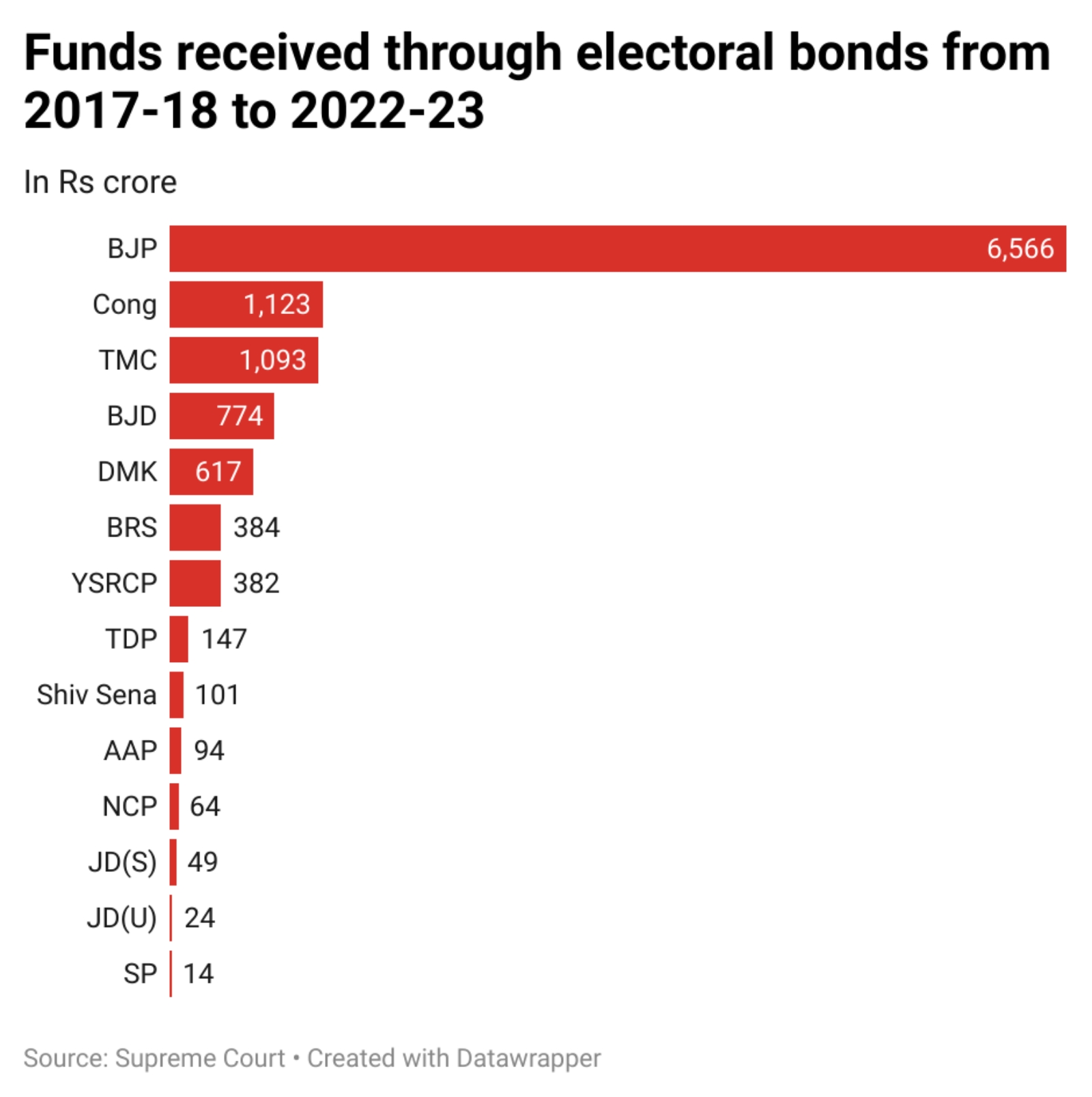The Election Commission of India (ECI) has made public the comprehensive data on the controversial electoral bond scheme on March 15, offering an unprecedented look into the anonymous corporate funding received by political parties.
This disclosure comes after the State Bank of India (SBI), the sole authorized bank for issuing and managing these bonds, shared the complete details with the ECI as per the Supreme Court’s directive to enhance transparency in political funding.
The data reveals that a staggering 22,217 electoral bonds valued at Rs 16,518 crore were issued from April 2019 to February 2024, with 22,030 of these already encashed by various parties.
Among the high-profile donors are major corporates like Bharti Airtel, DLF, Vedanta as well as individual tycoons like Lakshmi Mittal.
The ruling BJP emerges as the biggest beneficiary, redeeming bonds worth Rs 6,566 crore, followed by Opposition parties like Congress and regional outfits.
The release has reignited the debate around the anonymity provisioned by the scheme, with critics flagging accountability concerns even as parties defend it as a legitimate funding avenue.
As stakeholders analyze the implications, the spotlight is on potential reforms to strike a balance between transparency and parties’ financial needs.

Key Figures from the ECI Released Data

The data, spanning from April 2019 to February 15, 2024, reveals the following key statistics:
- Total Bonds Issued: A total of 22,217 electoral bonds were issued during this period.
- Bonds Redeemed: Out of the issued bonds, 22,030 were redeemed by various political parties, while 187 remain unredeemed.
- Corporate Donors: Several prominent corporate entities feature in the list of donors who purchased electoral bonds, including Grasim Industries, Megha Engineering, Piramal Enterprises, Torrent Power, Bharti Airtel, DLF Commercial Developers, Vedanta Ltd., and Apollo Tyres.
- High-Profile Individuals: Noted industrialists like Lakshmi Mittal also purchased electoral bonds, alongside financial institutions such as Edelweiss and PVR.
- Significant Buyer: Notably, Future Gaming and Hotel Services, an entity scrutinized by the Enforcement Directorate, emerged as a significant buyer with electoral bonds worth over Rs 1,350 crore.
Political Parties and Funding Received
The data reveals the political parties that encashed the electoral bonds and the respective amounts received:
- Bharatiya Janata Party (BJP): The ruling party redeemed electoral bonds worth Rs 6,566 crore, constituting approximately 54.77% of the total value.
- Indian National Congress: The principal opposition party encashed bonds worth Rs 1,123 crore, or 9.37% of the total.
- Trinamool Congress: The party redeemed bonds worth Rs 1,092 crore.
- Other Recipients: Several regional parties, including the AIADMK, Shiv Sena, TDP, YSR Congress, DMK, JDS, NCP, RJD, AAP, and Samajwadi Party, also received funding through electoral bonds.
Comparative Statistics on Political Funding
According to data from the Association for Democratic Reforms (ADR):
- Electoral bonds constituted 58% of the total income of national political parties between 2018-19 and 2021-22.
- The share of income from unknown sources for national parties rose from 66% (2014-15 to 2016-17) to 72% (2018-19 to 2021-22).
- Direct corporate donations account for a portion of political funding, but the debate continues on the transparency and accountability of different funding modes.
Reactions and Perspectives
The release of the electoral bond data has sparked diverse reactions from stakeholders:
- Civil society organizations have expressed concerns about the lack of transparency and potential for undue influence.
- Political parties have offered varying responses, with some defending the scheme as a necessary funding mechanism and others calling for reforms.
- The Supreme Court’s recent judgment striking down key provisions of the electoral bond scheme has intensified discussions on political funding reforms.
As the nation grapples with the implications of these revelations, the debate on ensuring transparency and accountability in political funding while addressing the legitimate financial needs of parties continues.
Also Read: SBI’s Landmark Disclosure Reveals Identities of Anonymous Electoral Bond Purchasers to EC













Comments 2